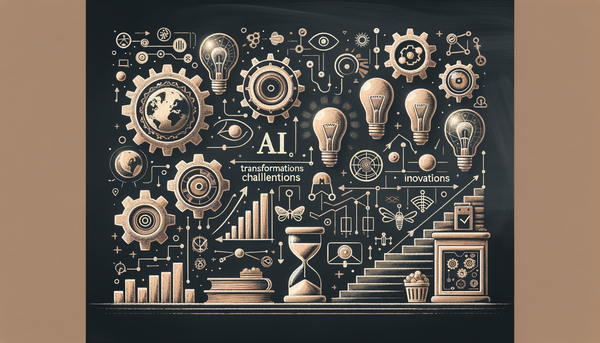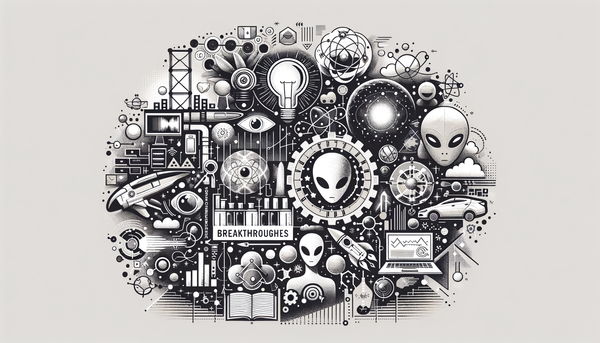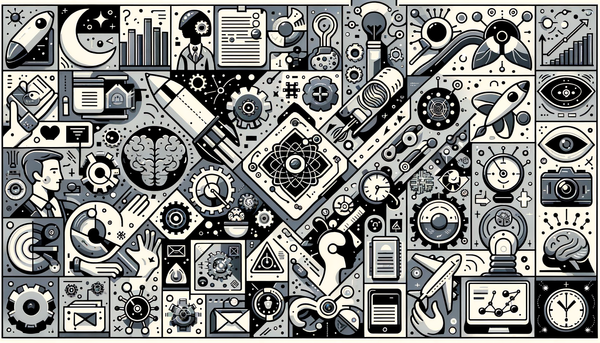AI News Podcast Update: Innovations and Challenges in AI
Did you know that while Google prepares to dazzle developers with its Gemini-powered innovations at I/O 2025, AI technologies are simultaneously rewriting the rules of art, culture, and even religious forecasting? From engineering breakthrough sessions to transformative corporate strategies, the AI landscape is rapidly expanding, weaving together the realms of tech events, ethical challenges, international competitiveness, and enterprise disruption.
Innovations on the Developer Stage: Google I/O 2025 Unveiled
Google I/O 2025 is not just another tech conference – it is a veritable launchpad for future-defining innovations. With sessions spanning Android, AI, Web, and Cloud, the event promises to redefine user experiences and developer methodologies in a digital era hungry for efficiency and creativity. The spotlight on the Gemini ecosystem and advancements in Android 16 highlight Google’s drive to integrate tools like Jetpack Compose, Kotlin Multiplatform, and transformative new APIs into the future of connected technology.
The keynote opening the event on May 20 sets the tone for dynamic interactions, reflecting how AI is moving beyond experiments into real-world applications. Specifically, web sessions are set to introduce built-in AI APIs that could very well reconfigure performance benchmarks in digital UIs. This paradigm encourages a rethinking of traditional coding practices by simplifying complex technologies into elegant expressions using HTML and CSS.
In a similar spirit, another update on our site elaborates on how such innovations resonate within the broader tech ecosystem. Whether it is the evolution of Firebase or the promise of improved productivity through new API capabilities like Gemini, these sessions underscore the necessity for embracing forward-thinking tools that transform the fabric of application development.
Networking and Knowledge: AI Events Leading the Charge
The buzz surrounding TechCrunch Sessions: AI, where Early Bird tickets offer significant discounts along with a plus-one deal, underscores the social dimension of AI innovation. Renowned voices like Jared Kaplan from Anthropic are expected to join discussions that delve into product launches amidst competition from major industry players. These sessions are more than just conferences – they are crucibles for networking, learning, and creative collaboration.
Attendees come away not only with insights into integrating AI within startup ecosystems but also with a newfound appreciation for the intricacies of security practices and policy frameworks essential in guiding AI ethics. As a seasoned observer once noted,
“The key to AI is not about creating robots that think like humans, but developing systems that enhance human abilities and solve real-world problems.”
This sentiment perfectly embodies the dynamic spirit driving these events.
Moreover, these gatherings create an interesting counterpoint to more technical sessions at events like Google I/O 2025, highlighting the balance between groundbreaking research and the pragmatic aspects of business innovation. By linking these experiences with our featured posts, such as the updates on latest trends and breakthroughs in the AI landscape, enthusiasts can appreciate how learning, networking, and application converge in modern tech forums.
Challenges of AI in Uncharted Territories: From Papal Predictions to Cultural Biases
Not every domain is easily decipherable by even the most advanced AI. A standout example is the attempt by AI chatbots like ChatGPT and Elon Musk's Grok to predict the next pope in the wake of Pope Francis’s passing. The inherent secrecy and deep-rooted traditions within the Vatican pose unique challenges to algorithms that typically excel in data-rich environments. Although candidates like Cardinal Pietro Parolin are flagged as potential frontrunners, the very matrix of prediction is hampered by limited transparency and the space where human wisdom meets deeply spiritual decision-making.
This interplay between tradition and technology invites us to consider the limits of data-driven forecasting in contexts where qualitative judgment and internal deliberations reign supreme. The difficulty here reminds one of a familiar challenge in AI research – bridging the gap between machine logic and human nuance, an issue that surfaces across multifaceted applications.
Simultaneously, another compelling challenge in AI is the unintended propagation of cultural stereotypes across languages and regions. Margaret Mitchell’s pioneering work with the SHADES dataset draws attention to how AI systems, when predominantly trained on English datasets, can inadvertently reinforce harmful biases in non-English languages. Evaluating biases that span gender roles, ethnic stereotypes, and linguistic nuances requires a holistic approach, one that both understands the intricacies of diverse cultures and leverages technology to challenge outdated preconceptions.
This phenomenon is not merely a technical fault but a reflection of societal patterns. At the heart of the matter is an urgent call for more inclusive data practices. As AI systems start to interact globally, it becomes imperative to recognize cultural diversity as a strength rather than a liability. For a broader discussion on challenging AI stereotypes, you may explore related insights in our ongoing series on AI innovations and challenges.
Global AI Strategies: US Leadership Versus China's Real-World Wins
The competition in the international AI race showcases contrasting philosophies in harnessing technological prowess. In the United States, cutting-edge research and innovative prototypes frequently dominate headlines. However, recent observations suggest that China’s tangible real-world applications are steadily converting AI breakthroughs into demonstrable economic wins. Chinese ventures like DeepSeek are not only gaining accolades for innovative use cases but also receiving direct attention from top government stakeholders such as President Xi Jinping and tech magnates like Jack Ma.
This orchestration of technology and policy reflects a distinctive, centralized strategy that has propelled AI solutions into industries at an accelerated pace. By investing in areas like autonomous vehicles, intelligent computing, and integrated communications, Chinese enterprises are setting a benchmark in effectively harnessing AI for scaled application. The flexibility shown by regulatory frameworks in China, in contrast to the more cautious approach seen in regions like the European Union, highlights a renewed focus on rapid deployment and real-world testing.
Besides international strategic moves, domestic success stories are equally compelling. ZTE Corporation’s impressive 7.8% revenue uptick in Q1 2025 underscores the merits of integrating AI across diverse products, from communications infrastructure to smart home solutions. Their commitment to leveraging AI not only champions efficiency but also embodies the broader digital transformation that is reshaping telecommunications globally. This impressive fusion of AI with connectivity further illustrates how the technology is redefining business success by emphasizing both innovation and market agility.
Readers interested in the ongoing evolution of corporate AI strategies can also check out our insightful piece on AI insights in finance and legal developments, which draws parallels between strategic deployment and emerging market trends.
Revolutionizing Enterprise: Auditing, Workforce Readiness, and Document Processing
One of the most pragmatic applications of AI can be seen in the transformation of traditionally labor-intensive sectors. KPMG’s integration of AI into its Clara Smart Audit Platform is a prime example. Here, AI agents automate mundane processes from data analysis to document review, enabling auditors to focus on areas that require human expertise. Far beyond mere automation, this integration supports higher quality audits, robust risk evaluations, and smarter resource allocation in the world of finance. It is a clear demonstration of AI’s potential in bridging operational efficiency with precise decision-making in complex business environments.
Yet, parallel to these corporate applications, studies like Workera’s 2025 State of Skills Intelligence Report expose a critical disconnect in perception regarding AI readiness between leadership and employees. While an overwhelming majority of company leaders are optimistic about rapid AI adoption, the workforce remains skeptical—a disparity that not only signals miscommunication but also highlights the need for more robust and inclusive training initiatives. Only a fraction of employees feel adequately prepared to incorporate AI into their roles, despite widespread company claims emphasizing AI’s significance. This observation reinforces the idea that a well-defined strategy, along with clear and continuous communication, is essential for truly capitalizing on technological advancements.
On a different front, AI innovation is also revolutionizing how companies process information. A recent breakthrough on Amazon SageMaker demonstrates how a modular, AI-powered platform can transform document workflows using cutting-edge techniques such as named entity recognition (NER) and large language models (LLMs). This innovative approach streamlines everything from metadata enrichment to summarization, transitioning tedious manual tasks into swift, automated operations. The capacity to process tens of thousands of documents with speed and accuracy spells a new era for data-driven decision-making in archival research and business intelligence.
Integrating these examples, it becomes apparent that as AI expands its footprint, industries across the board—from financial auditing to document management—are leveraging its capabilities to enhance operational efficiency while preserving core human judgment. If you’re keen to explore further on how businesses are capitalizing on AI technology, do check out our coverage of trends and case studies on evolving AI landscapes.
Crossover Perspectives: Learning from Mistakes and Moving Forward
The multi-dimensional discussions surrounding AI are not without concerns. For instance, the challenges associated with predicting outcomes in opaque structures like the Vatican or mitigating biases that seep into AI outputs across different cultures represent significant hurdles for researchers. These challenges serve as potent reminders that as AI becomes more ubiquitous, the ethical and operational frameworks governing its application must evolve in tandem.
Such reflections echo the wise words of Jeff Bezos, who once stated,
“Artificial Intelligence is going to have a profound impact on the way the world works. It will change how we think about decision-making and problem-solving.”
The integration of AI into diverse sectors can lead to exponential benefits, but it also demands vigilance in ensuring that these technologies serve all segments of society equitably.
This balance between embracing innovation and being mindful of its limitations is further exemplified by the intricate dance between human intuition and machine efficiency. Whether it is managing internal audits, ensuring workforce readiness, or continuously refining AI models to prevent stereotype reinforcement, there is a shared understanding that technology must be guided by ethical considerations and robust oversight.
Emerging frameworks like SHADES are critical in this context, reminding us that preventing AI bias is not just about code or data—it is about understanding the cultural impacts of technology. By engaging in these corrective measures, the AI community can pave the way for systems that reflect our diverse societal values while driving forward technological advancement.
Looking Ahead: Embracing the Future with AI
The panoramic view of AI advancements presented across these diverse updates is a testament to the transformative power of this technology. From immersive and session-driven events like Google I/O 2025 and TechCrunch Sessions: AI to integrated systems in auditing and document processing via platforms like Amazon SageMaker, AI is permeating every facet of our professional and personal lives.
In the global arena, while countries like the United States showcase technological ingenuity, real-world wins in places like China and progressive industry integrations by corporations such as ZTE highlight an evolving battle where outcomes matter as much as innovatory thought. This multifaceted progression is further enriched by ongoing debates on ethical practice, workforce training, and the gradual shift toward a more inclusive AI narrative that addresses biases across languages and cultures.
The journey ahead is as challenging as it is promising. We stand at an inflection point where the fusion of human ingenuity and artificial intelligence can either herald a new era of enlightened progress or remind us of the importance of empathy and ethical oversight in technology. For a deeper dive into the evolving challenges and innovations in AI, our readers are encouraged to explore adjacent insights in our posts on innovations and challenges and our comprehensive overviews of the latest AI trends.
As I reflect on these developments, I invite you to consider: can AI truly capture the subtleties of human culture, or will we always need that irreplaceable human touch in shaping our future? Perhaps, in bridging these gaps, we are actually laying the foundation for a more resilient, informed, and inclusive digital era.
Further Readings
- Innovations and Challenges in AI
- Exploring the Evolving Landscape of AI
- Latest Trends and Breakthroughs in AI
- AI Podcast Updates: AGI, AI in Finance, and Legal Developments
Final Thoughts
In the rapidly evolving world of artificial intelligence, every breakthrough is a stepping stone toward a more integrated and dynamic future. Whether it is in groundbreaking developer events, bold international strategies, or transformative enterprise practices, AI continues to reimagine what is possible. With each innovation, we are reminded that while technology can drive change, the blend of human insight and ethical consideration remains the ultimate key to success.




